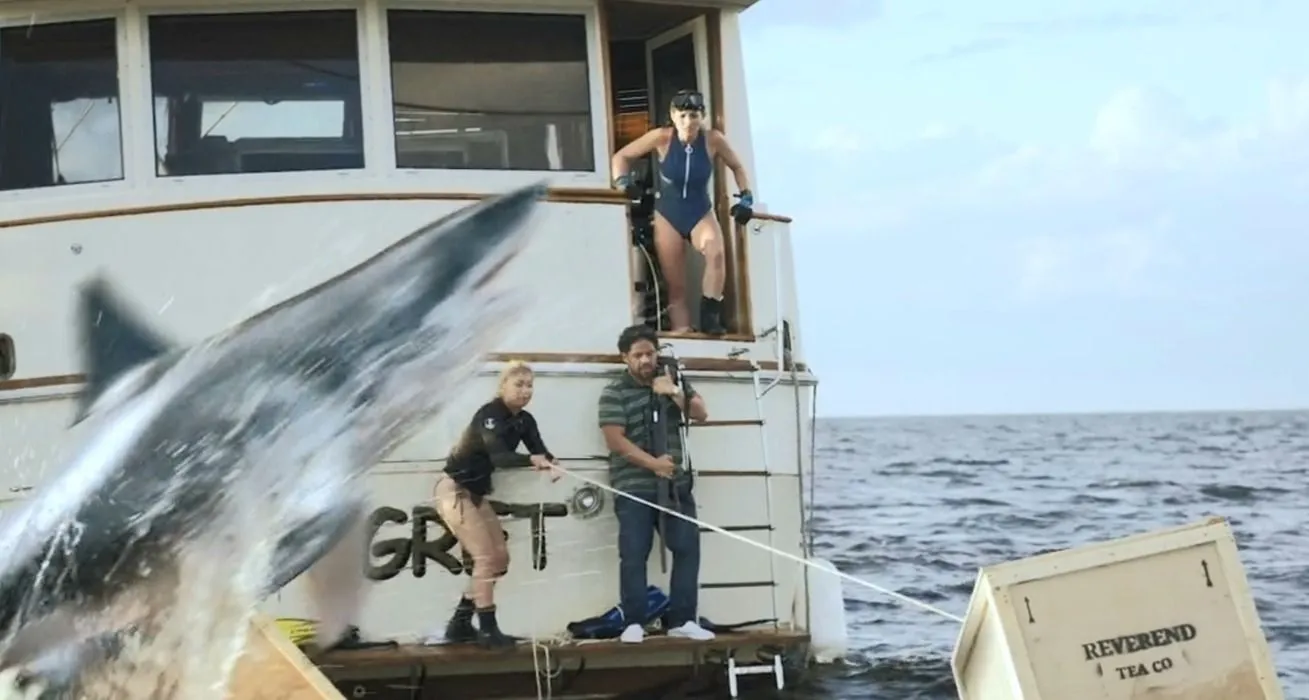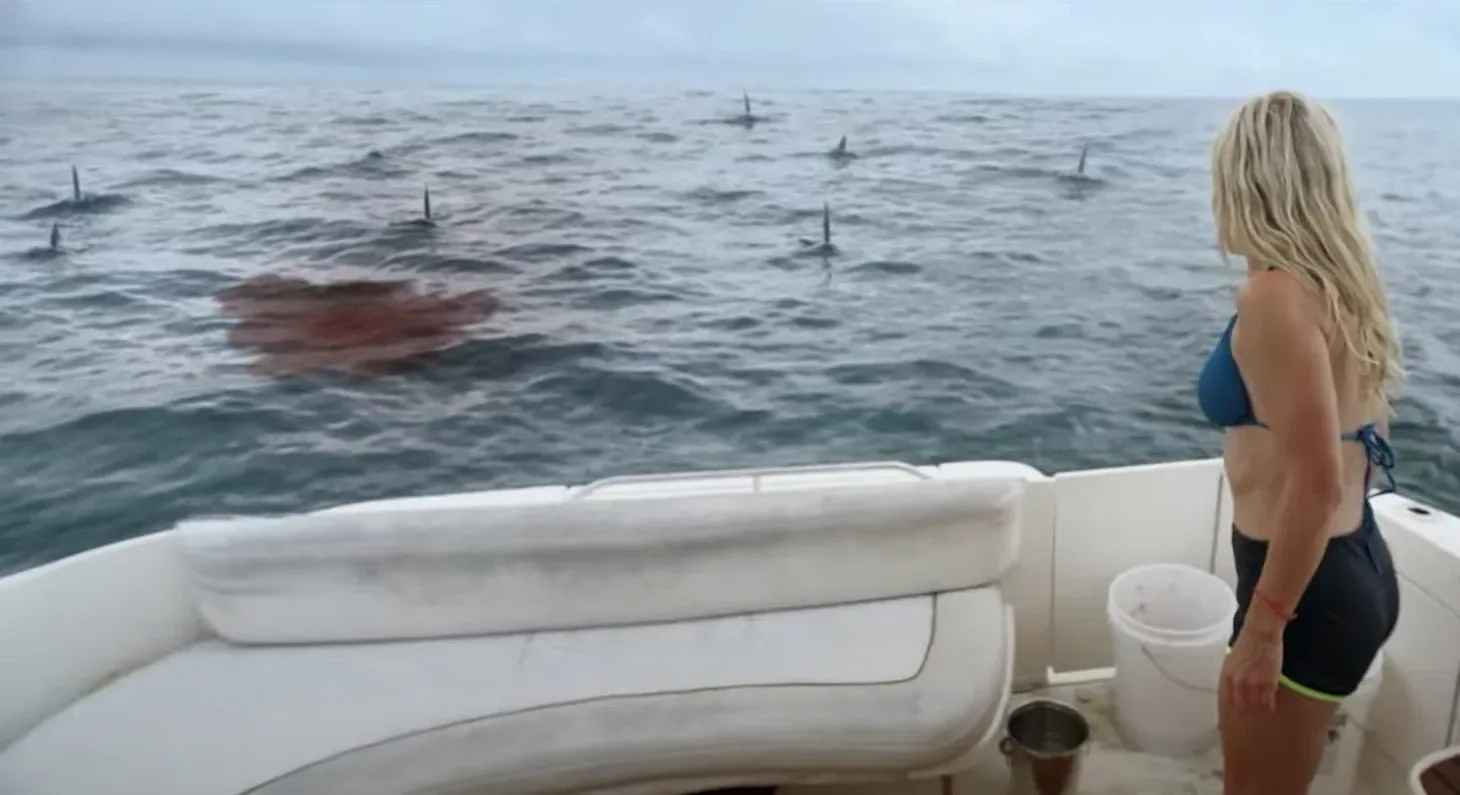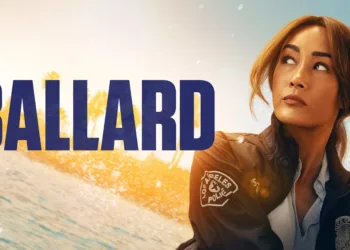In the sun-bleached waters off the Florida Keys, a simple transaction of illicit goods spirals into a primal confrontation. Great White Waters wades into familiar territory, pitting a crew of drug smugglers against a swarm of preternaturally aggressive sharks.
The film drops audiences directly into the chaos, where the recovery of sunken cocaine becomes a desperate fight for survival. Caught in this maelstrom is Gia, a lone woman adrift on her boat, whose quiet day is violently interrupted by this collision of criminal ambition and animal instinct.
The director, Anthony C. Ferrante, brings a certain expectation from his past work with airborne sea predators, signaling that this is not a tale of subtle suspense but a full-throated exercise in B-movie spectacle. The premise is a stark and brutal equation: desperate people, valuable contraband, and a sea of hungry teeth.
The Human Element as Afterthought
The characters in this aquatic nightmare are less living beings and more functional archetypes assembled for the slaughter. At the center is Gia, a heroine burdened with a tragic honeymoon backstory that does little to inform her actions.
She emerges as an instant expert on shark psychology, armed with a convenient electronic deterrent that feels less like a piece of technology and more like a screenwriter’s emergency tool. Angela Cole gives Gia a steely resolve, fulfilling the role’s demands without being given the space to create a person. The antagonists are cut from similarly thin cardboard.
The drug lord, Reverend, is a caricature of menace, issuing commands from afar. His crew, led by the feuding Jareth and Charlotte, engages in petty power struggles that are bafflingly out of place while their colleagues are being devoured.
Their squabbles are not human drama; they are distractions. Character development is a foreign concept here; each individual remains locked in a cycle of self-interest, their illogical choices serving only to thin the herd.
The Aesthetics of Expediency
The film’s visual and technical construction speaks to a philosophy of speed over substance. Ferrante’s direction follows a well-worn path for the creature feature, assembling scenes with a workmanlike efficiency that seldom generates genuine tension.
The thrills feel manufactured, relying on a predictable rhythm of jump scares and bloody encounters. The true stars, the sharks, are digital ghosts haunting the production. These CGI creations are weightless and unconvincing, launching themselves from the water with a scripted intelligence that betrays any sense of naturalism.
They behave like sentient torpedoes, targeting specific characters or objects with pinpoint accuracy. This artificiality extends to the cinematography, which remains largely confined to the claustrophobic decks of two boats. The Florida Keys setting offers a beautiful backdrop that the repetitive camera work fails to exploit, reinforcing a sense of budgetary limitation that defines the entire viewing experience.
A Narrative Adrift in a Sea of Absurdity
The story is built on a foundation of pure convenience. A throwaway line about a storm is offered as the sole explanation for why these waters are teeming with hyper-aggressive predators, a flimsy excuse for the carnage that follows. From there, the narrative progresses through a series of baffling decisions made by characters who seem to possess no survival instincts.
The script lurches from one set piece to another, propelled by nonsensical actions designed to place people in the water. An attempt at self-aware humor, involving a henchman’s complaint about the paperwork required for contract killing, is a fleeting, clumsy nod toward the film’s own absurdity.
The movie never fully commits to being a clever parody or a straightforward thriller, existing in a strange limbo. A final, ridiculous sight gag during the climax offers a flash of the bonkers energy that might have saved the picture, a moment of inspired lunacy in an otherwise tedious affair. It is a spectacle of schlock that asks for indulgence it rarely earns.
Great White Waters premiered on Tubi on July 4, 2025, as a free streaming release.
Full Credits
Director: Anthony C. Ferrante
Writers: Anthony C. Ferrante, Geoff Meed
Cast: Angela Cole, Johnny Ramey, Steve Hanks, Ashton Leigh, Hector Becerra
The Review
Great White Waters
Great White Waters is a cinematic shipwreck, sunk by a nonsensical plot, paper-thin characters, and laughable special effects. While glimmers of absurd, B-movie fun occasionally surface in the bloody foam, they are too fleeting to rescue the viewer from the tedious depths of its execution. It is a film that fails as both a serious thriller and a self-aware comedy, leaving behind a forgettable slick of chum in its wake.
PROS
- A straightforward, high-concept premise pitting smugglers against sharks.
- The climax features a moment of ridiculous camp that might appeal to B-movie fans.
- Offers mindless aquatic carnage for undemanding viewers.
CONS
- Unconvincing and poorly rendered CGI sharks.
- The plot is filled with logical gaps and nonsensical character actions.
- One-dimensional characters with no development.
- Fails to generate genuine suspense or thrills.
- Attempts at self-aware humor are largely unsuccessful.

















































